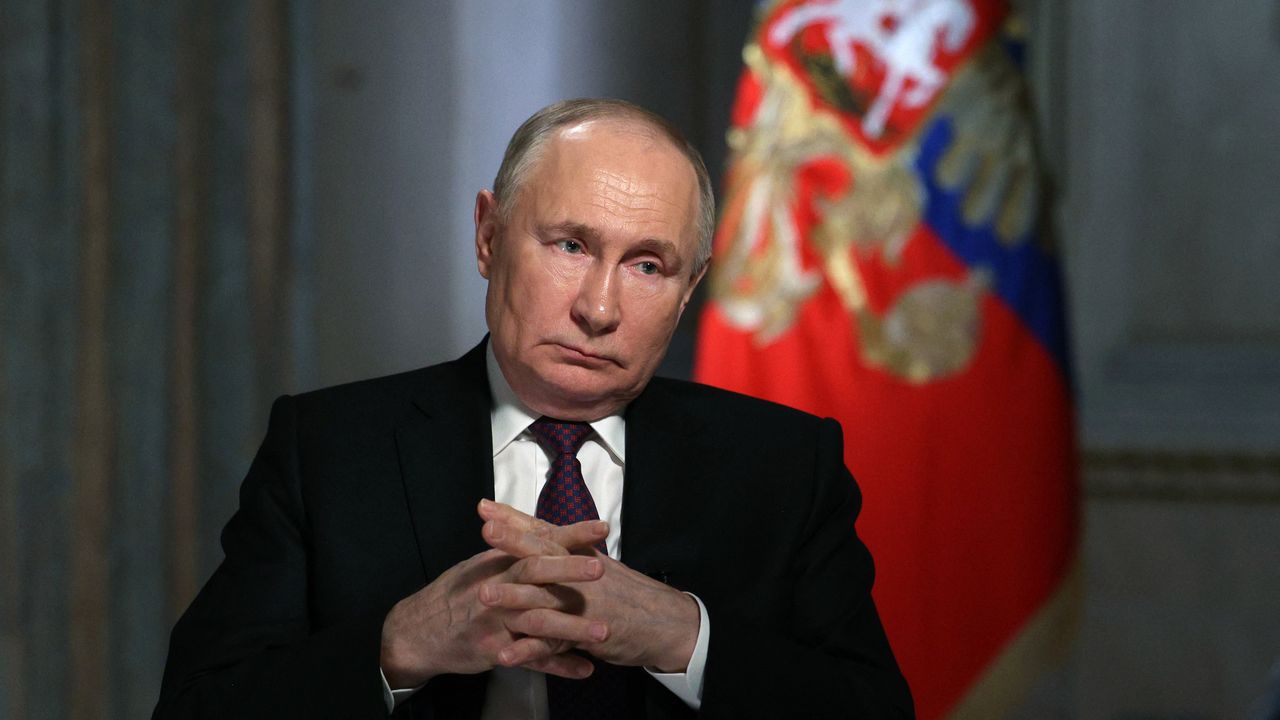
[ad_1]

Russian autocrat Vladimir Putin late on Sunday unsurprisingly claimed victory in what Russia said was an election for its presidency, solidifying his rule throughout the remainder of this decade and into the 2030s.
Why it matters: What millions of people voted in over the past few days — in some cases against their will — and what 71-year-old Putin won wasn’t an election in any traditional sense of the word.
- It was instead a rigged box-checking performance with only three opponents who had been previously vetted by the country’s Kremlin-controlled elections commission.
- All opposition candidates who could have challenged Putin or his brutal invasion of Ukraine were either barred from the contest or have been exiled, imprisoned or have died under suspicious circumstances.
By the numbers: Putin won 15,759,224 votes — 87.97% of all votes cast, said Central Electoral Commission chief Ella Pamfilova on Russian state TV in an announcing the initial official results, beating his 2018 vote share record. State-run exit polls predicted he had won 87% of ballots to be elected for a fifth term.
- Turnout, too, was an astounding 74.22% — the biggest in history, Russian officials proclaimed.
What he’s saying: “Out of every voice, we are building a common will of the people of Russian Federation,” said Putin during a news conference following Sunday’s election, per a BBC translation.
- The former KGB operative said that he had “special gratitude to our warriors on the line of contact,” a reference to his invading forces in Ukraine.
The big picture: This year’s “election-style event,” as well as previous ones, operated this way because Russia remains one of the least-free countries in the world as a result of power being amassed by Putin while he has continuously held positions as president or prime minister since 1999.
- Throughout his rule, the constitution was altered to formally extend his presidency by over a decade, the party he by de facto leads has come to dominate the legislature and the Kremlin has tightened its iron grip over the country’s frail judiciary.
Yes, but: The Kremlin has many tools to inflate votes and to ensure that voter turnout reaches certain levels
- There’s also strong evidence Russian authorities simply falsify electoral figures.
Between the lines: Even though the outcome is known well in advance, Russia holds these election-style events in part because it must project at least a veneer of legitimacy domestically and abroad.
- Domestically, they serve as demonstrations of power from the Kremlin to regional and local leaders and and loyalty tests in the reverse order, Carnegie Endowment’s Ekaterina Kurbangaleeva writes.
- And they allow the Kremlin to internationally profess that the Russian people are united and that the president is implementing foreign policy based on people’s demands, former Kremlin adviser Konstantin Kalachev told Deutsche Welle.
Zoom in: Though the Russian opposition movement suffered a major blow with Alexei Navalny’s suspicious death in an Arctic prison last month, it worked throughout the election-style event to undermine Putin’s victory.
- Russian authorities arrested and detained more than 85 people in 21 cities for protesting the country’s elections, according to OVD-Info, a Russia-based human rights monitoring group.
- Putin called the protest movement’s attempts to ruin ballots “not democratic.”
The intrigue: Putin claimed during his news conference that he had agreed to a prisoner swap involving Navalny before the dissident’s death in prison last month.
Go deeper: U.S. announces $300 million in new military aid for Ukraine
Editor’s note: This article has been updated with details of official results and protest arrests.
[ad_2]
Source link